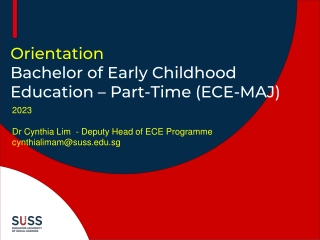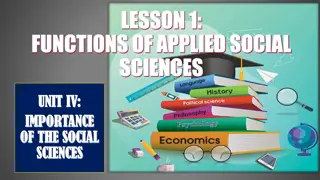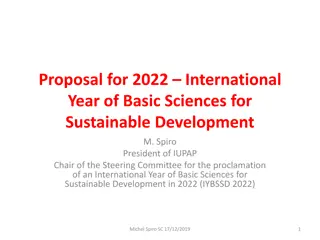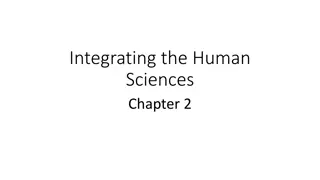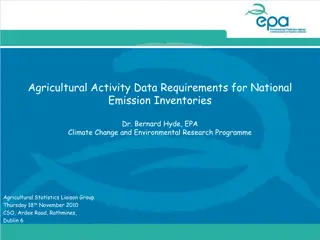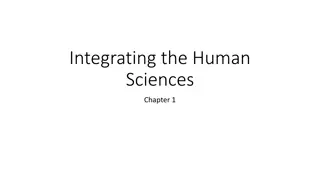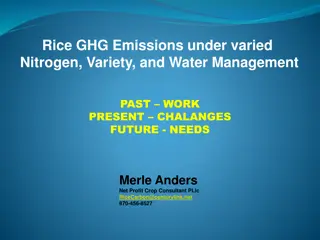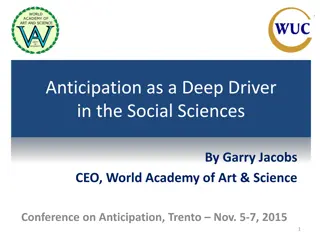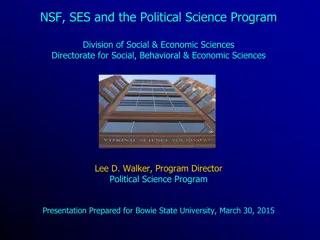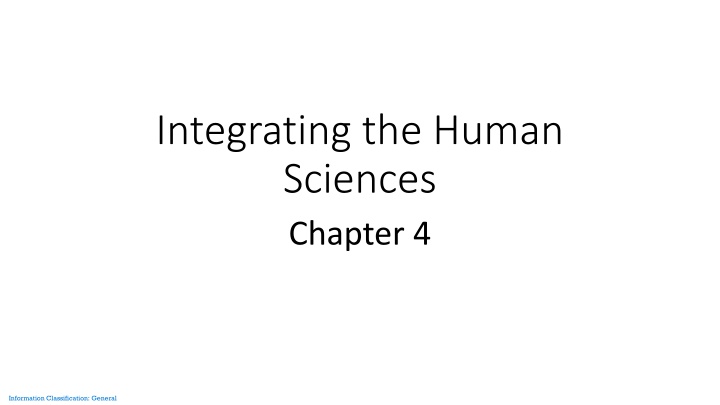
Specialized Research Communities in Human Sciences
This chapter dives into the need for specialized research communities in human sciences to focus on specific subsystems and causal links. It highlights the importance of interdisciplinary approaches and methodological flexibility in fields such as economy, politics, social structure, and culture. Emphasizing the significance of studying key questions within each specialized group, the chapter discusses the varying openness of different subsystems and the necessity for more targeted research efforts. The text sheds light on the current structure of disciplines in human sciences and suggests a more logical division based on subject matter.
Download Presentation

Please find below an Image/Link to download the presentation.
The content on the website is provided AS IS for your information and personal use only. It may not be sold, licensed, or shared on other websites without obtaining consent from the author. If you encounter any issues during the download, it is possible that the publisher has removed the file from their server.
You are allowed to download the files provided on this website for personal or commercial use, subject to the condition that they are used lawfully. All files are the property of their respective owners.
The content on the website is provided AS IS for your information and personal use only. It may not be sold, licensed, or shared on other websites without obtaining consent from the author.
E N D
Presentation Transcript
Integrating the Human Sciences Chapter 4 Information Classification: General
Introduction We should want specialized research communities to specialize by subject matter: on subsystems or sets of causal links. Some subsystems are less open than others. We will identify key questions that each group of specialized researchers should devote more attention to. We will show how each group of specialized researchers could employ additional methods (and theories). We will note that the present structure of disciplines in human science does not reflect a logical division of the subject matter. Information Classification: General
Economy Economy is more closed than most subsystems, but there are still important links to other phenomena. Economists should devote more attention to economic growth; this will require both interdisciplinarity and methodological flexibility. Economists should also pay more heed to the links between economy and social structure. Information Classification: General
The Economic Subsystem Income distribution Output of Goods and Services Prices of Goods and Services Economic ideology Unemployment Inflation Economic institutions Information Classification: General
Politics Politics is a very open system. Political scientists should devote more attention to studying the causes and characteristics of stable democracy This will require both interdisciplinarity and methodological flexibility. Information Classification: General
Social Structure Social structure is also a very open system. Social structure is studied in many fields that are not well integrated. One obvious question is how discrimination is encouraged or discouraged. In this as in other matters, scholars must strike a careful balance between studying internal and external causal links. Information Classification: General
Culture It is important to appreciate that cultures are both internally diverse and changing. It is then important to carefully investigate the links within the cultural subsystem. Values likely need to be broadly consistent, but links from values to some cultural expressions and to languages may be far weaker. Cultures seem to play a critical role in human functioning and thus we need to understand the roles that particular cultural phenomena play in human societies. We are hampered by vague definitions of culture. Research should focus on particular causal links rather than attempting to grapple with culture as a whole. Information Classification: General
The Cultural Subsystem Information Classification: General
Health It is important for human scientists to explore the social determinants of health outcomes. We need a more integrated approach to addressing complex public health issues. Health research is scattered across multiple disciplines with limited interaction. Information Classification: General
Art Art is also a very open subsystem. We should pay more attention to how and why art moves us. There is scope for application of diverse methods. Scholars of art should focus on particular causal links involving artistic phenomena rather than theorizing about all of human science. Scholars should be more comparative in orientation so that we can better distinguish the aesthetic from cultural effects (and causes) of art. Information Classification: General
Environmental Humanities The field of environmental humanities should show, rather than assume, that art can encourage environmental sensitivity. It should examine particular causal links, rather than embracing an ever-changing series of broad topics. The Anthropocene is a useful term, perhaps, but research is better focused on particular phenomena and causal links rather than seeking to define the elusive essence of the Anthropocene. Information Classification: General
Science and Technology A more robust and integrated study of (the missing discipline of) science and technology might understanding of how to encourage beneficial innovation while discouraging harmful innovation. We should integrate across applications of diverse methods. generate a more nuanced Information Classification: General
Human Nature Psychologists in recent decades have added much to our understanding of two key questions for human science: the sources of human happiness and the nature of human decision-making. In both cases, there is scope for integrating across a wider range of methods. Information Classification: General
Environment Human scientists need to collaborate with natural scientists. Human scientists studying environmental issues should have some understanding of natural processes. The study of the environment in human science is widely scattered. Greater coherence is desirable. Information Classification: General
History Historians can detail how humans cope with complexity. They can also clarify the nature of contextual generalizations by comparing causal links across a diverse range of contexts. They can allow us to comprehend causal links that unfold over long time frames. Information Classification: General
Philosophy We need far greater efforts at integration in philosophy. In epistemology, we could better know which practices are justified by a range of epistemologies and more practical methodologies. In ethics, we could better know which practices receive strong justification from each of the five types of ethical analysis. In metaphysics, we could integrate scientific and philosophical understandings in a manner that encourages enhanced human science understanding. Human science would benefit if philosophers appreciated that no argument is perfect and thus we should identify hypotheses (both philosophical and scientific) that can be justified in multiple ways. Information Classification: General
Concluding Thoughts Our system-wide perspective allowed us to identify for every subsystem (and for philosophy and history) important questions that deserve more attention, and methods that deserve wider application. Our system-wide perspective also exposes the fact that the disciplinary structure of human science is illogical, and does not provide a clear disciplinary home for specialized research into most human science subsystems. The author is unaware of a similar exercise being performed elsewhere. Information Classification: General

